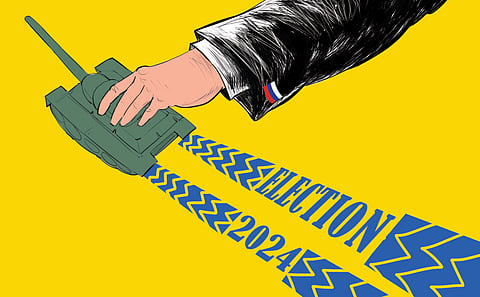

There are times when one wonders whether Prime Minister Narendra Modi has been a below-the-radar ‘Russianist’ or an unabashed Russophile. Of course, it is possible to be both. Modi’s congratulatory message on Monday to Russian President Vladimir Putin on his magnificent election victory made headlines against the backdrop of the nasty characterisation of the poll as a sham and a fraud by the Western and Indian press.
Feelings are running high in Western capitals with the growing realisation that it is too late to influence the outcome of the Ukraine war. A covert attempt to destabilise Russia appeared in the run-up to the presidential election on March 15-17. A 1,500-strong strike force from across the border with Ukraine comprising Russian speakers in a special unit and a large number of foreign fighters supported by tanks and armoured personnel carriers (including Bradley infantry fighting vehicles) and shock troops from elite Ukrainian units made a desperate attempt to capture some Russian territory in the Belgorod region.
The operation ended in a fiasco and the polling went ahead as scheduled. The entire operation was aimed at weakening support for Putin and disrupting the election in Russia.
Now Plan B is unfolding to discredit the election result. But the turnout of 74 percent speaks for itself. In reality, this has been a vote on Putin and not about democracy. The Russian electorate handed down a resounding mandate of support and approval of Putin’s handling of the war and, equally, in steering the economy to an impressive growth trajectory as well as an ambitious blueprint of modernisation and innovation. There is a manifest surge of Russian nationalism, which Putin epitomises. Western capitals are loathe to accept it.
Modi’s message to Putin—followed by a phone call to Putin on Wednesday—acknowledges this reality and takes note of its profound implications for India’s relations with Russia. Even Modi’s detractors will admit that the US-led proxy war against Russia puts to the ultimate test India’s time-tested relationship with Russia. No doubt, India held its ground despite the immense pressure from the Biden administration. The India-Russia relationship has touched a qualitatively new level and acquired forward-looking dynamics. But for our prime minister’s farsightedness and hands-on role, this would not have happened.
In the latest meeting of the Ukraine Defence Contact Group on Tuesday at the Ramstein Air Base in Germany, US Defence Secretary Lloyd Austin offered more words than ammunition to Ukraine to fight the war. He promised that the world’s democracies won’t let Kiev down, but he was short on specifics—on how much concrete help to offer. Austin also admitted that Moscow has made a series of battlefield gains.
Indeed, it is difficult to predict the House Republicans releasing the funds for Ukraine now that Donald Trump is the only Republican candidate left.
The stalemate puts the onus on the Europeans to do the heavy lifting. But as Wolfgang Münchau, a German editor, wrote this week, “The problem with the Western alliance on Ukraine is a combination of US reluctance, German red lines and French grandstanding… French support for Ukraine comes mostly in the form of rhetoric—as opposed to direct financial and military assistance. Measured in terms of gross domestic product, France ranks number 28 among Ukraine’s supporters.”
Germany is a much bigger supporter of Ukraine, both financially and militarily. But German combat deployment is a red line for Berlin, which also opposes the dispatch of Taurus cruise missiles to Ukraine, fearing that Kiev might use them to hit targets in Russia.
Meanwhile, the big unanswered question for everyone is what the Europeans would do if a Trump-led US administration were to withhold support for Ukraine war. There are no easy answers. A tantalising prospect remains, though, that at some point, Europeans may increasingly revert to the old reflex of carving out deals with Russia favourable for the resuscitation of their ailing industry and acceleration of their economic recovery. The worse their economy performs, the greater the temptation will be.
From such a perspective, Modi is positioning himself astutely. According to a Bloomberg report, the India-Ukraine joint commission has been scheduled to meet in New Delhi next week, which will facilitate extensive consultations between the visiting Foreign Minister Dmytro Kuleba and his Indian counterpart. Significantly, on Wednesday, Modi also called Ukrainian President Volodymyr Zelenskyy, who had pulled all stops in resorting to what some would call terrorist methods to disrupt the Russian election. And this happened after a call with Putin earlier in the day, where the Ukraine issue figured.
An incredibly complex scenario is indeed unfolding. The Russian foreign intelligence chief Sergey Naryshkin disclosed on Tuesday inputs to the effect that a French “contingent to be sent to Ukraine is already being prepared. Initially, it will include around 2,000 troops”. He forewarned that the French troops could “become a legitimate priority target for attacks by the Russian armed forces. This means that they will suffer the fate of all the French who have ever come to the Russian world with a sword”. Putin no longer rules out World War III.
France refuted the Russian allegation but French TV is also holding animated discussions about the modus operandi of an expeditionary force. True, Modi has an exceptionally warm equation with French president Emmanuel Macron, who had spoken about the deployment of western troops in Ukraine in case of a Russian advance on Odessa. France, historically, has played a strong role in that region and would certainly regard it as a strategic disaster if Russia controlled the entire Black Sea.
To be sure, India finds itself in a trapeze act, insofar as peace talks cannot begin unless the protagonists realise that they have reached the limits of what they can choose to do to change the situation. But then, endgames in wars often appear at such inflection points, given the possibility of some kind of curveball coming at you in the twinkling of an eye, without warning.
(Views are personal)
M K Bhadrakumar | Former diplomat